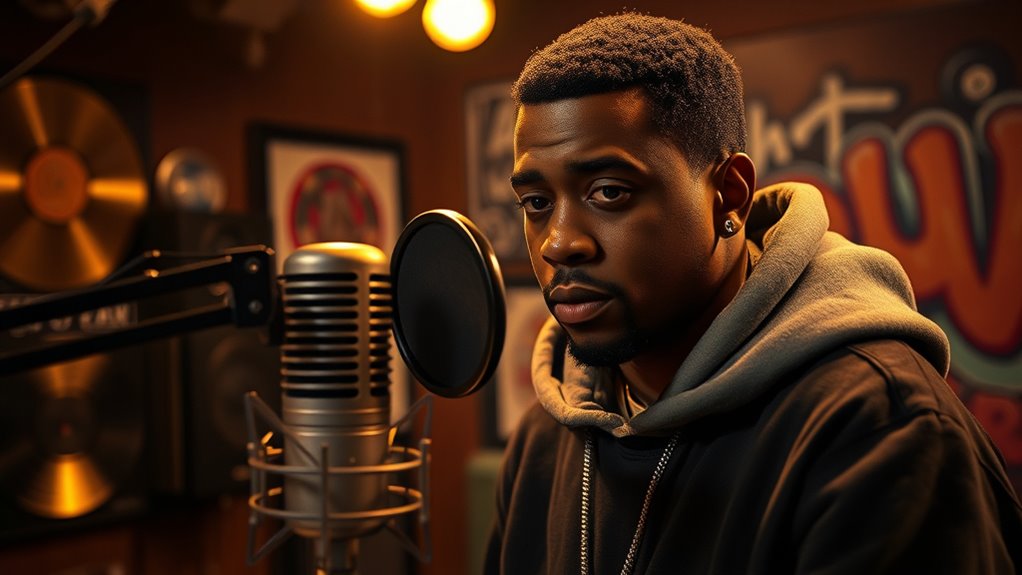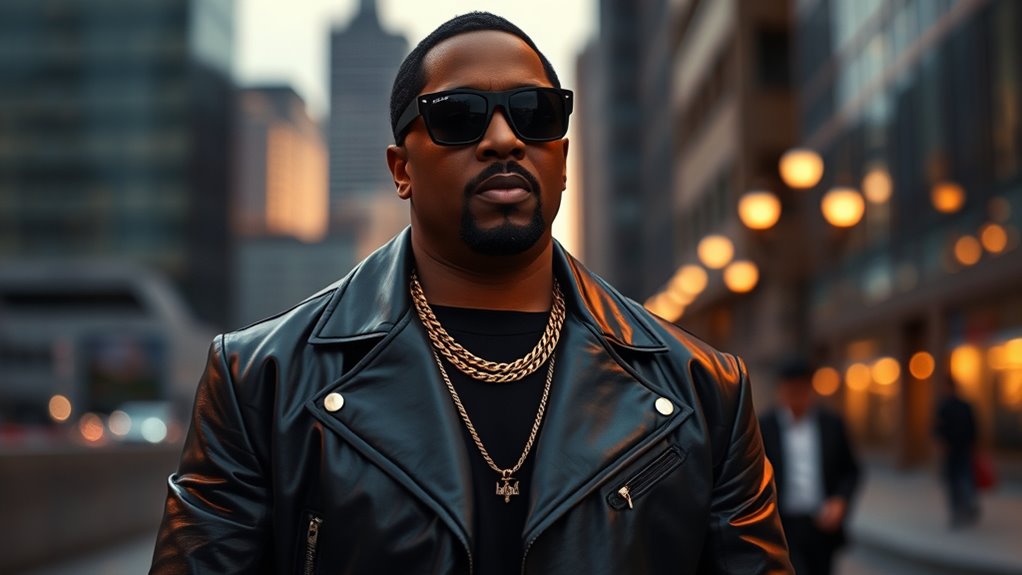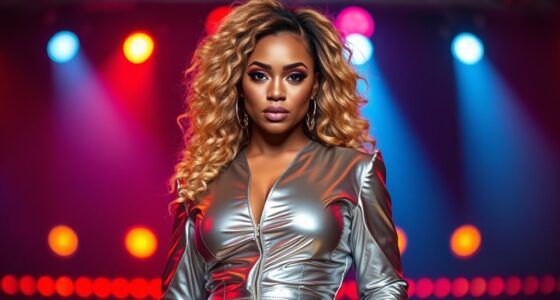Diddy, aka Sean Combs, is a true hip-hop mogul who transformed the industry with his music, fashion, and business ventures. You’ll see how he started in the early ’90s, managing artists like Mary J. Blige, and later launched Bad Boy Records, creating hits with legends like The Notorious B.I.G. and Jay-Z. His empire expands into fashion, media, and beverages, shaping culture and inspiring many. If you want to explore his journey and influence, keep going.
Key Takeaways
- Diddy, born Sean Combs, is a pioneering hip-hop mogul who revolutionized the industry through music, fashion, and media ventures.
- He co-founded Bad Boy Records, launching iconic artists like The Notorious B.I.G. and transforming hip-hop into a global commercial force.
- Beyond music, he built a cultural empire with brands like Sean John, Cîroc, and Revolt TV, influencing streetwear and entertainment industries.
- Recognized with multiple Grammy Awards and a Hollywood Walk of Fame star, his influence extends across music, fashion, and entrepreneurship.
- Despite legal challenges and controversies, his legacy as a transformative figure in hip-hop and Black entrepreneurship remains significant.
Early Beginnings and Rise in Music

Sean Combs, born on November 4, 1969, in Harlem, New York, faced early hardships after losing his father, Melvin Combs, when he was just three years old. Raised by his mother Janice in Mount Vernon, he grew up with limited resources but a strong drive to succeed. He attended Howard University for two years, hosting influential parties that showcased his talent for connecting with people. In 1990, he dropped out to intern at Uptown Records, quickly earning a promotion to Vice President within a year. His keen ear for talent led him to manage artists like Jodeci and produce Mary J. Blige’s early albums. When he was fired in 1993, he used that setback as fuel to launch his own label, Bad Boy Records, marking the start of his rise in the music industry.
Building a Cultural Empire With Fashion and Business

Have you ever wondered how a rapper transformed his influence into a multifaceted cultural empire? Sean Combs, aka Diddy, did just that through his fashion and business ventures. In 1998, he launched Sean John, blending hip-hop style with luxury, winning the CFDA Menswear Designer of the Year in 2004. The brand expanded into fragrances and fashion moments that shaped streetwear into high fashion. He also founded Revolt TV, a media platform celebrating Black culture, producing award-winning documentaries and upcoming projects. Diddy’s business acumen earned him a top spot among entrepreneurs, with a net worth of around $1 billion by 2022. His diversified portfolio includes entertainment production, fashion, beverages, and education, with ventures like Bad Boy Records, Capital Prep Harlem, and Combs Wines & Spirits contributing to his influence. Rebranding his empire as Combs Global in 2023, he continues to influence culture, blending fashion, media, and entrepreneurship to build a lasting legacy. Furthermore, his strategic use of brand diversification has played a crucial role in establishing his long-term success.
Signature Sounds and Musical Collaborations
You can hear Diddy’s influence in his genre-blending techniques, mixing hip-hop with R&B and orchestral sounds to create a signature style. His iconic collaborations with artists like The Notorious B.I.G. and Mary J. Blige showcase his talent for crafting hits that cross musical boundaries. These collaborations and unique production choices define his sound and continue to shape hip-hop’s evolution. Additionally, his work in fashion and entrepreneurship has further cemented his status as a multifaceted innovator in the music industry influencing future artists. His innovative use of sound design techniques, such as blending different audio elements, has helped set new standards in hip-hop production.
Genre Blending Techniques
Diddy’s signature sound emerges from his innovative blending of hip-hop with R&B and electronic music elements, creating a distinctive sonic palette that appeals to diverse audiences. He merges smooth R&B vocals with hip-hop production, exemplified in Diddy – Dirty Money’s *Last Train to Paris*, which integrates electro and dance influences. His singles, like “Coming Home,” feature synth-heavy atmospheres layered with emotive hooks, bridging hip-hop and pop. Diddy’s electronic infusion, using synthesizers and glitch effects, targets international dance markets. His production techniques often rework iconic samples, balancing urban grit with pop shine. Additionally, forming the rap supergroup Dream Team and producing Diddy – Dirty Money showcases his ability to fuse multiple genres and vocal styles, broadening his musical horizons and audience reach. Incorporating genre-blending techniques such as these allows Diddy to create a unique sound that resonates across different listener demographics.
Iconic Collaborations and Features
Iconic collaborations and features have played a crucial role in shaping Diddy’s influence across hip-hop and R&B. You see, he’s been an executive producer on Mary J. Blige’s first two albums, helping define early ’90s R&B. His work with Jodeci and launching The Notorious B.I.G.’s career with *Ready to Die* created legendary tracks like “Juicy” and “Big Poppa.” His singles, like “Can’t Nobody Hold Me Down” with Mase and “I’ll Be Missing You” with Faith Evans and 112, achieved worldwide success and Grammy acclaim. Diddy’s collaborations with artists like Lil’ Kim, Missy Elliott, and Jay-Z, along with numerous guest appearances, showcase his talent for blending styles. These partnerships cement his reputation as a master connector, shaping the sound and culture of hip-hop and R&B. His production work on classic albums further solidified his status as a pioneering force in the genre, with collaborative projects often pushing the boundaries of musical innovation.
Signature Production Styles
Signature production styles define Diddy’s influence in shaping the sound of hip-hop and R&B, blending innovative techniques with a distinctive ear for melody and rhythm. You notice his heavy use of soul and gospel samples fused with contemporary beats, creating a smooth yet energetic backdrop. He often employs slowed-down, chopped loops and orchestral elements like strings and horns for a cinematic feel. His signature mid-tempo grooves balance club appeal and radio-friendliness, with prominent basslines and crisp snares shaping the track’s energy. Diddy’s vocal production features layered harmonies, catchy hooks, and vocal effects like reverb and delay, adding depth. His collaborative approach, involving emerging producers and experimenting in studio sessions, helps maintain a polished, mainstream-ready sound that influences industry trends. His active involvement in the studio ensures that his signature sound remains fresh and adaptable to evolving musical landscapes. Additionally, his use of studio techniques such as sampling and mixing enhances the overall quality and distinctiveness of his productions.
Navigating Legal Challenges and Public Controversies

Steering legal challenges and public controversies requires a strategic approach, especially when allegations involve serious misconduct and threaten both reputation and business interests. You face multiple civil lawsuits from over 150 plaintiffs spanning decades, accusing you of abuse, sexual misconduct, and trafficking, with some victims as young as minors. Federal charges in 2025, including sex trafficking and racketeering, led to a trial where most charges were dropped, but you remain incarcerated pending sentencing. These allegations have cast a long shadow over your business empire, from music to fashion, intensifying public scrutiny. Prominent attorneys like Tony Buzbee advocate for victims, highlighting systemic issues within the industry. Navigating this turmoil demands careful legal strategies to protect your reputation and manage ongoing litigation and public perception. Additionally, understanding divorce guidance and related legal considerations can be crucial in managing personal and business affairs during such turbulent times.
Recognitions and Awards Shaping His Legacy

Despite the ongoing legal battles and public controversies, Diddy’s influence in the music industry has been cemented through a long list of recognitions and awards. You see, he’s won three Grammy Awards, including for work linked to his debut album *No Way Out*, which topped *Billboard* and featured the groundbreaking “I’ll Be Missing You.” He’s also the first solo artist to replace himself at number one on *Billboard* Hot 100 with “Mo Money Mo Problems.” Diddy received multiple BET and MTV Video Music Awards, including the 2003 MTV TRL Lifetime Achievement Award, highlighting his cultural impact. Industry peers have honored him with nominations and awards across film, television, and music, reflecting his multifaceted influence. His chart records and sales achievements, along with cross-industry recognitions, solidify his legacy as a true hip-hop mogul. His Grammy wins continue to be celebrated as milestones in his prolific career. Additionally, his cultural influence has extended beyond music into fashion, entrepreneurship, and philanthropy, shaping his enduring legacy.
Influencing Industries and Defining Black Entrepreneurship

You see how Diddy’s ventures have reshaped multiple industries, from fashion to beverages, proving that Black entrepreneurs can build vast empires. His brand, Sean John, and partnerships like Cîroc show how cultural influence fuels commercial success. By expanding into real estate and creating jobs, he’s redefining what Black entrepreneurship can achieve. His legal issues and detention have also impacted his business operations and public perception, highlighting the challenges faced by entrepreneurs navigating legal and financial hurdles. Additionally, his efforts in digital entrepreneurship demonstrate how modern entrepreneurs leverage online platforms to expand their influence and revenue streams.
Fashion Industry Impact
How has Sean Combs, through his fashion ventures like Sean John, transformed the industry and reshaped perceptions of Black entrepreneurship? By launching Sean John in 1998, he proved Black-led brands could achieve mainstream prestige and billion-dollar valuations. His blend of urban streetwear and luxury inspired new fashion standards, bridging hip-hop and high fashion. The brand’s success showcased that Black entrepreneurs could dominate a historically Eurocentric industry. Additionally, his efforts have emphasized the importance of industry transformation in challenging racial stereotypes and opening doors for future Black designers and entrepreneurs.
Business Empire Expansion
Sean Combs has expanded his influence well beyond fashion, building a diverse business empire that spans beverage, media, music, and lifestyle brands. In the beverage industry, he partnered with Cîroc, boosting sales from 40,000 to over a million cases annually and generating more than $100 million in personal revenue. He also co-founded Aquahydrate, growing it to $65 million in sales by 2020. In media, he founded Revolt TV, reaching 25 million subscribers quickly and adding $200 million to his net worth. His music ventures include founding Bad Boy Records, launching iconic artists, and maintaining valuable catalog royalties. Additionally, he created Sean John, a fashion brand sold worldwide. Through strategic partnerships and investments, you recognize how he’s redefining black entrepreneurship and expanding his empire across multiple industries. [His recent acquisition of cannabis retail stores and production facilities further exemplifies his ongoing diversification efforts, with a deal valued up to $185 million that positions him as a leading figure in the emerging legal cannabis market. Moreover, his ventures into the entertainment industry demonstrate his commitment to innovation and cultural influence.
Cultural Influence Recognition
What makes Diddy’s influence on culture and Black entrepreneurship so significant is his ability to shape industries and elevate Black-owned brands to global prominence. He has pioneered models that prove Black ventures can thrive in mainstream markets, from founding Bad Boy Records to launching Sean John. His efforts transformed hip-hop into a commercial powerhouse, blending music, fashion, and lifestyle. Diddy’s recognition, like his Hollywood Walk of Fame star, symbolizes hip-hop’s legitimacy and Black entrepreneurship’s strength. His innovations in branding and media, such as Revolt TV, continue to influence how Black culture is represented and celebrated worldwide.
| Industry | Contribution | Impact |
|---|---|---|
| Music | Discovered major artists | Mainstream success for hip-hop |
| Fashion | Launched Sean John | High fashion integration |
| Media & Marketing | Created Revolt TV, endorsement deals | Expanding hip-hop influence |
Frequently Asked Questions
What Inspired Sean Combs to Start His Own Record Label?
You’re curious about what inspired Sean Combs to start his own record label. After facing challenges and being fired from Uptown Records, he was motivated to gain control over his career. He wanted to nurture talented artists, produce authentic hip-hop and R&B music, and have creative independence. His drive was fueled by a desire to shape his own destiny, build a legacy, and influence the music industry on his own terms.
How Did Diddy’s Fashion Ventures Influence the Hip-Hop Industry?
You might think fashion and hip-hop stay separate, but Diddy’s ventures proved otherwise. Ironically, his clothing lines transformed streetwear into high fashion, challenging stereotypes and elevating urban culture. By blending hip-hop with luxury, you see how he reshaped industry standards, inspiring artists to monetize their influence beyond music. His success showed that fashion could be a powerful tool for cultural expression, breaking barriers in both industries.
What Are Diddy’s Most Successful Collaborations With Other Artists?
You’re curious about Diddy’s most successful collaborations. He teamed up with The Notorious B.I.G. and Mase on hits like “Juicy” and “Been Around the World,” which topped charts and became classics. His work with Faith Evans and 112 on “I’ll Be Missing You” also achieved major success. Additionally, collaborations with rock legend Jimmy Page on “Come With Me” and sampling legendary artists helped Diddy shape cross-genre hits that boosted hip-hop’s mainstream appeal.
How Has Diddy’s Legal History Affected His Career and Reputation?
Your question about how legal history affects a career and reputation is essential. You see, legal issues, especially serious allegations, can tarnish public image and cause industry setbacks. Even if someone maintains their career, trust and credibility often suffer. In this case, the extensive allegations and convictions have led to canceled deals, public criticism, and a damaged legacy, making it harder to maintain influence and respect within the industry.
What Is Diddy’s Current Involvement in Music and Business?
Imagine you’re stepping into a world where legacy and resilience collide, like the dawn of the internet. You’re actively involved in music and business, releasing *The Love Album: Off the Grid* independently and collaborating with King Combs and Kanye West on *Never Stop*. You continue to shape hip-hop through executive roles at Bad Boy Records, mentoring new artists, despite ongoing legal challenges that test your influence and determination.
Conclusion
As you reflect on Diddy’s journey, you see a towering figure shaping a vibrant mosaic of music, fashion, and business. His relentless drive ignites a spark in the industry, like a lighthouse guiding aspiring entrepreneurs through stormy seas. With each bold move, he crafts a legacy etched into the skyline of Black entrepreneurship—an enduring beacon of innovation, resilience, and cultural influence that continues to inspire and illuminate your path forward.










